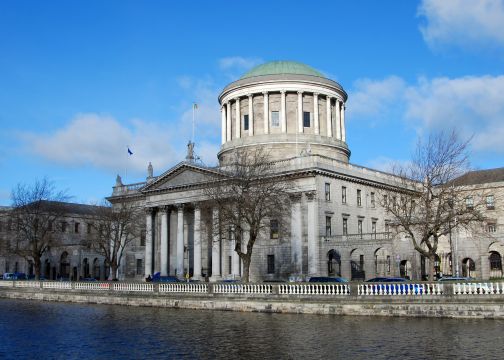A 43-year-old homeless man charged with breach of the peace arising out of Saturday's anti-lockdown protest in Dublin was freed from custody after his bail was lodged by someone at the prison, the High Court has heard.
Lawyers for Joseph Reynolds had brought a High Court challenge to the lawfulness of his detention arguing that the imposition of a €50 cash lodgement bail condition was tantamount to a refusal of bail given that he was homeless and only had €7.
After the bail was lodged later on Monday morning so he could be released, Mr Justice Charles Meenan, who had put the case back to later in the day for prison and DPP to be represented, ruled the District Court was entitled to impose the €50 bail condition.
Mr Reynolds was among a number who appeared before Dublin District Court on Saturday night in connection with the protest and all were granted their own bail on conditions including that they lodged cash of €50 or €100.
Legality of detention
But because Mr Reynolds is homeless, on disability benefit and only had €7, he was unable to raise a €50 cash lodgement requirement imposed in his case by the District Judge who remained him in custody.
On Monday morning, his lawyers applied to the High Court for an inquiry into the legality of his detention under the habeas corpus Article 40 provision of the constitution.
When the case returned on Monday afternoon, the judge was told by Giollaíosa O'Lideadha SC, for Mr Reynolds,that later in the morning someone lodged the €50 at the prison and he was therefore able to take up the bail. It was not known who lodged the money.
Counsel opposed the DPP and prison side's application for costs in the case. He argued Mr Reynolds was entitled to his costs because it was falling below the minimal standards of constitutional justice for a District Judge to say you are all going to jail for two nights over the weekend if you don't come up with the cash lodgement.
Jurisdiction

Gráinne O'Neill BL, for the governor of Cloverhill Remand Prison and the notice party, the DPP, said her side should be entitled to costs because this application should have been brought through the normal High Court bail application list, not under Article 40. The District Judge was within his jurisdiction to set the bail terms he did, she said.
Mr Justice Meenan agreed the District Judge was acting within his jurisdiction and also found the warrant remanding Mr Reynolds in prison was good on its face.
What was being claimed was that effectively by fixing the €50 bail it was a denial of bail and as events transpired that was not what happened, he said. It was manifestly clear it was not a denial of bail insofar as that term had been met and the process was in train for the prison to release him.
The appropriate order in this case was that there be no order as to costs which means both sides pay their own costs particularly as the accused is of extremely limited circumstances, he said.







